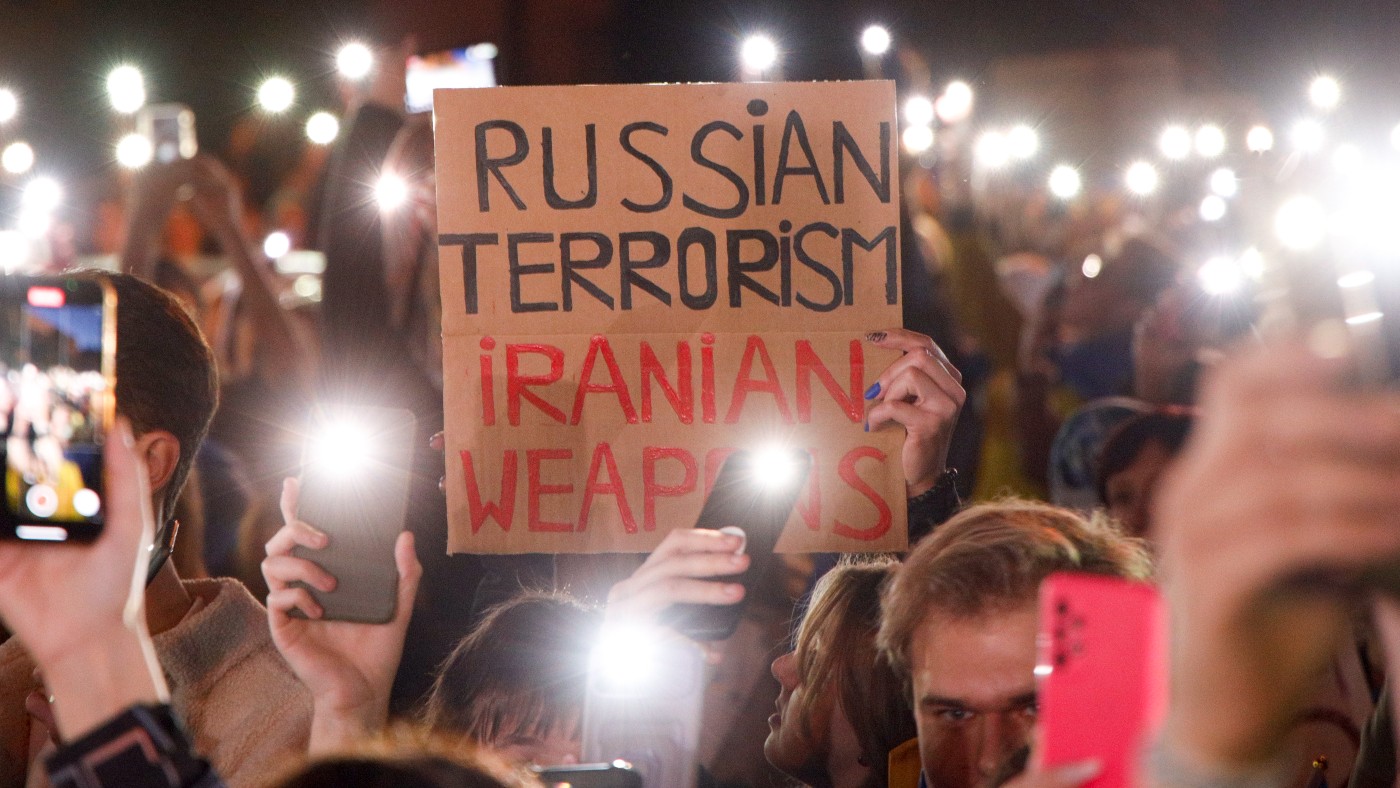What Iranian Kamikaze drones mean for Ukraine
Iranian officials have denied supplying the drones but ‘no one believes them’

A free daily email with the biggest news stories of the day – and the best features from TheWeek.com
You are now subscribed
Your newsletter sign-up was successful
Kamikaze drones were “flying low and slow” over central Kyiv on Monday morning, said John Paul Rathbone and Christopher Miller in the FT. They were Iranian Shahed-136s, dubbed “mopeds” by the Ukrainians because of the buzzing noise made by their cheap two-stroke engines. One crashed into a street; another exploded into a residential building. Among the civilian dead that day were a young couple, the woman six months pregnant.
The drones are effectively “cheap cruise missiles”, which can be pre-set to hit specific targets up to 1,500 miles away, and their relatively low price – $20,000 apiece – means they can be unleashed “in swarms”.
Since the 8 October attack on the Kerch Bridge from Crimea to the Russian mainland, the Kremlin’s forces have “stepped up efforts to inflict suffering from afar”, said The New York Times. A barrage of drone and missile attacks have targeted Ukrainian civilians and infrastructure. A third of the country’s power stations have been destroyed, resulting in widespread blackouts. Kyiv’s water supply has also been interrupted, and now Ukrainians face “the prospect of a desolate winter without basic services”.
The Week
Escape your echo chamber. Get the facts behind the news, plus analysis from multiple perspectives.

Sign up for The Week's Free Newsletters
From our morning news briefing to a weekly Good News Newsletter, get the best of The Week delivered directly to your inbox.
From our morning news briefing to a weekly Good News Newsletter, get the best of The Week delivered directly to your inbox.
Iranian officials have denied supplying the drones, said Michael Day in the i newspaper. “No one believes them.” It’s clear that Russia and Iran “have entered into a desperate marriage of convenience as they both try to defy Western sanctions and retain their grip on power.” Russia needs Iran’s help because it has burned through its stocks of weaponry; Iran badly needs money. But this “unholy alliance” between pariah regimes may “prompt others to act”.
Involvement threatens to ‘globalise’ war
Israel has so far refused to send military aid to Kyiv, but it will be hard to stand by for long as Russia continues to bankroll the military-industrial complex of its greatest enemy. And Israel could send Ukraine some of the best air defence systems in the world.
Iranian involvement threatens to “globalise” the war, said The Times. Israel is already fighting Iranian proxy forces in Syria, whose airspace is controlled by Russian forces. The situation is potentially explosive, as Kremlin figures pointed out when they warned Israel against involvement.
Either way, the Iranian drones will not turn the tide of the war, said Dan Sabbagh in The Guardian. They have a “limited destructive capacity”, and their use only proves that Russia is running short of more powerful guided missiles.
A free daily email with the biggest news stories of the day – and the best features from TheWeek.com
No evidence to show strategy will work
Besides, the whole strategy of attacking Ukrainian civilians and infrastructure won’t work, said Max Boot in The Washington Post. “There is, in fact, virtually no evidence from the past 100 years that terror-bombing has been a war-winning tactic. The usual result is to unite the population in defiance.”
Ukrainian forces continue to liberate occupied territory; Russia began the evacuation of the key southern city of Kherson this week. “The combination of Russian barbarism and Ukrainian military success is keeping the anti-Putin coalition united.”
-
 Local elections 2026: where are they and who is expected to win?
Local elections 2026: where are they and who is expected to win?The Explainer Labour is braced for heavy losses and U-turn on postponing some council elections hasn’t helped the party’s prospects
-
 6 of the world’s most accessible destinations
6 of the world’s most accessible destinationsThe Week Recommends Experience all of Berlin, Singapore and Sydney
-
 How the FCC’s ‘equal time’ rule works
How the FCC’s ‘equal time’ rule worksIn the Spotlight The law is at the heart of the Colbert-CBS conflict
-
 Will increasing tensions with Iran boil over into war?
Will increasing tensions with Iran boil over into war?Today’s Big Question President Donald Trump has recently been threatening the country
-
 Corruption: The spy sheikh and the president
Corruption: The spy sheikh and the presidentFeature Trump is at the center of another scandal
-
 Putin’s shadow war
Putin’s shadow warFeature The Kremlin is waging a campaign of sabotage and subversion against Ukraine’s allies in the West
-
 The fall of the generals: China’s military purge
The fall of the generals: China’s military purgeIn the Spotlight Xi Jinping’s extraordinary removal of senior general proves that no-one is safe from anti-corruption drive that has investigated millions
-
 Epstein files topple law CEO, roil UK government
Epstein files topple law CEO, roil UK governmentSpeed Read Peter Mandelson, Britain’s former ambassador to the US, is caught up in the scandal
-
 Iran and US prepare to meet after skirmishes
Iran and US prepare to meet after skirmishesSpeed Read The incident comes amid heightened tensions in the Middle East
-
 Which way will Trump go on Iran?
Which way will Trump go on Iran?Today’s Big Question Diplomatic talks set to be held in Turkey on Friday, but failure to reach an agreement could have ‘terrible’ global ramifications
-
 Syria’s Kurds: abandoned by their US ally
Syria’s Kurds: abandoned by their US allyTalking Point Ahmed al-Sharaa’s lightning offensive against Syrian Kurdistan belies his promise to respect the country’s ethnic minorities